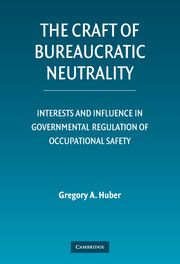 The Craft of Bureaucratic Neutrality
The Craft of Bureaucratic Neutrality 5 - Conclusion
Published online by Cambridge University Press: 27 July 2009
Summary
Bureaucrats are policy-minded entrepreneurs who make strategic choices governed by both the constraints imposed by the political environment and the need to control their subordinates. Bureaucratic leaders can use their authority to change policy so long as they can avoid being rebuked by coalitions sufficiently powerful to compel changes in their behavior. Given this ongoing threat, bureaucratic leaders have incentives to seek politically efficient solutions in pursuit of their policy goals. In the enforcement context, a strategy that achieves these ends with minimal disadvantage is strategic neutrality, which combines the careful calibration of centrally directed discretionary decisions with tight control of subordinates.
In the case of the OSH Act, despite pressure from individual industries, businesses, and localities (and the politicians acting on behalf of them), OSHA has managed to implement the law with remarkable geographic and firm-by-firm consistency. OSHA does not tailor local or individual enforcement to the wishes of powerful elected officials or to the demands of any single interest group. This neutrality persists despite the strong local pressures on the agency and its dispersed workforce. This outcome points to the capability of bureaucratic leaders to insulate their subordinates from external political pressures. OSHA both recruits those motivated to police employer behavior and actively seeks to disrupt potential linkages between inspectors and interest groups or elected officials. The agency also pushes its subordinates to work hard, creating incentives that motivate uniform law enforcement.
- Type
- Chapter
- Information
- The Craft of Bureaucratic NeutralityInterests and Influence in Governmental Regulation of Occupational Safety, pp. 220 - 238Publisher: Cambridge University PressPrint publication year: 2007


